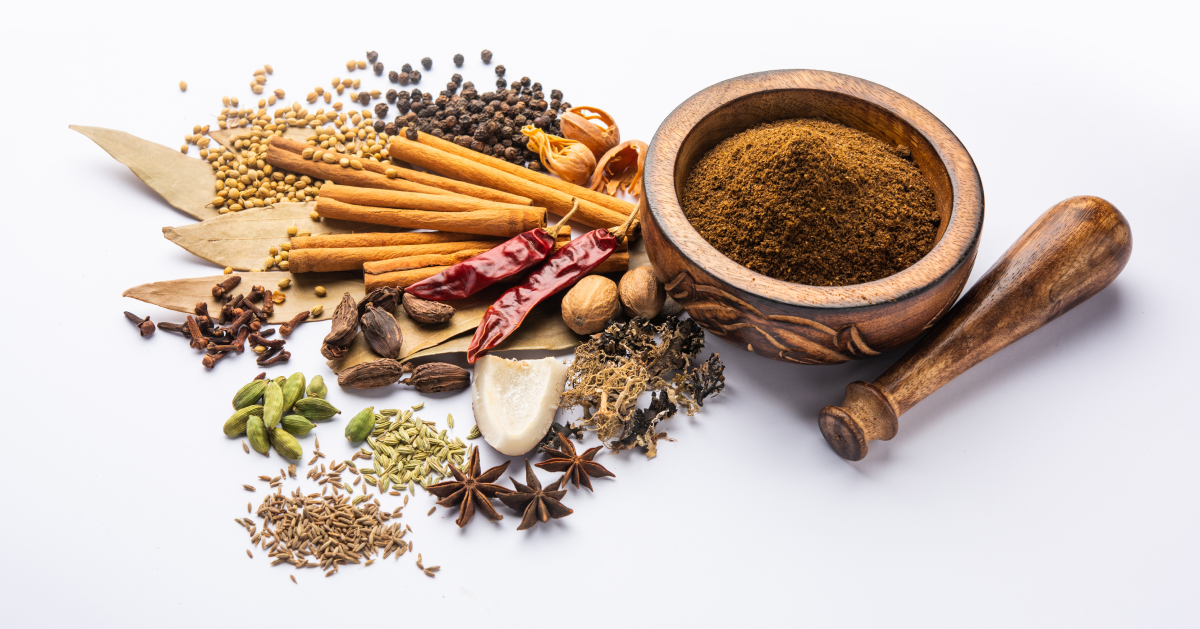
In today's fast-paced world, managing weight is a common concern for many people. While there are different approaches available, more and more people are seeking natural options to support their weight management goals. And the best place to begin? Your own spice rack or herb garden.
Throughout history, herbs have been revered for their medicinal properties, and many cultures have utilized them for their potential benefits in maintaining a healthy weight. They offer healthy inflammation support, blood-cholesterol support, and hormone nutrition that can be beneficial for weight management. Incorporating herbs into your daily consumption routine can be an easy and convenient way to support your weight management goals.
Let's explore the wonders of herbs and how they can help you achieve your weight management goals naturally.
1. Cayenne Pepper

Cayenne pepper is made up of a compound known as capsaicin, which gives it its signature heat properties. According to research, capsaicin can help your metabolism. Capsaicin affects diet-induced thermogenesis (DIT), satiety, and energy intake in the body, which play an important role in weight gain and loss.*[1] [2]
Capsaicin may also help with hunger cravings. An inconclusive study found that taking capsaicin capsules can help some people decrease their total caloric intake.*[3] Another limited study with 30 people reported that capsaicin positively affected the levels of ghrelin, the hormone responsible for hunger stimulation.*[4]
How To Consume Cayenne Pepper For Weight Management
The simplest consumption method is adding a dash or ¼ teaspoon of cayenne pepper to your juice or smoothie twice a day.
Cayenne Pepper Weight Management Recipe:
If you are looking for something more complex, you can create a cayenne lime elixir by following this recipe:
Ingredients:
- ¼ teaspoon cayenne pepper
- 2 limes
- 1 cup water
Preparation:
- Squeeze out the lime juice into a glass.
- Add a cup of water. (preferably warm or room temperature)
- Add cayenne pepper, and enjoy.
2. Ginger

Ginger is normally derived from the rhizome of Zingiber officinale. It is widely used in herbal medicine, with its use tracing back to 5,000 years ago in ancient Indian and Chinese civilizations. It is normally used to treat numerous concerns, and it may contain potential weight management benefits as well.
In a limited review of 14 human studies investigating the effects of ginger intake, the researchers reported that ginger supplementation resulted in decreased body weight in some participants.*[5]
In a 2018 study reviewing 27 human, animal, and test-tube studies, researchers reported that ginger root supports weight management by increasing hermogenesis while simultaneously inhibiting fat absorption and controlling appetite. Dietary supplementation and healthy lifestyle choices may also add to the efficacy of ginger root’s properties.*[6]
How To Consume Ginger For Weight Management
For easy consumption, you can chew half an inch of raw ginger root or add it to your juice, smoothies, and food recipes.
Ginger Tea Weight Management Recipe
A more elaborate way of consuming ginger is preparing our favorite elixir using the steps below:
Ingredients:
- 1-inch of ginger root
- 2 teaspoons of honey
- 1 cup of water
Preparation:
- Crush the ginger root.
- Add the crushed ginger root to a cup of water and boil it.
- Let it cool down a little, and add honey.
- Stir well, and strain the elixir into a cup.
3. Ginseng

Ginseng is a popular Traditional Chinese Medicine herb that contains multiple health-promoting benefits, including weight management. There are different types of ginseng, including American, Chinese, and Korean. However, they all belong to the same Panax genus of ginseng plants.
In a limited 2014 study investigating the effect of Panax ginseng in Korean women, researchers reported that taking Korean ginseng twice daily for eight weeks helped participants meet their weight management goals, as well as experience positive gut microbiota changes.*[7]
Similarly, a limited animal study reported that ginseng root supplementation supported the healthy formation of fat and absorption of fat in the intestines.*[8]
How To Consume Ginseng For Weight Management
There are many ways to consume ginseng. You can take ginseng root in capsule, liquid, or powder format by adding it to your tea or water.
Ginseng Tea Weight Management Recipe
Preparing ginseng tea is also another alternative consumption method you can consider. All you need is:
- 2 tablespoons of ginseng root
- 2 cups water
- 1 tablespoon of lime juice
- And a pinch of cinnamon powder
To prepare:
- Boil water and let it cool for 5 minutes.
- Add ginseng root and let it sit for 5 minutes.
- Strain the water.
- Add lime juice and cinnamon powder.
- Stir well and enjoy.
4. Turmeric

Dried Turmeric rhizome is a spice revered for its flavor, vibrant color, and potent medicinal properties. Turmeric naturally contains a fascinating chemical component called curcumin, lauded for its nutritional benefits.
In an inconclusive study of 44 people, researchers reported that consuming curcumin twice daily for one month was helpful in enhancing the success of weight management goals.*[9] Similarly, another limited study reported that supplementing mice with curcumin for 12 weeks supported body weight and body fat.*[10]
How To Consume Turmeric For Weight Management
One of the simplest ways to consume turmeric is by chewing half an inch of raw turmeric root. You can also sprinkle turmeric root powder into your meals.
Turmeric Weight Management Recipe
For those who love a good herbal brew, you can enjoy a turmeric drink using:
- ½ inch turmeric root
- 1 cup water
- ½ lime juice
- 1 teaspoon honey
To prepare,
- Crush the turmeric root.
- Boil a cup of water and let it cool down.
- Add the turmeric to the warm water.
- Add lime juice.
- Stir well before drinking.
- Add a teaspoon of honey to sweeten.
5. Black Pepper

Black pepper is a seed that is derived from the dried fruit of Piper nigrum. It is made up of a compound known as piperine, which gives it its strong flavor and potential weight management benefits.
In a limited 2011 study, researchers reported that supplementing with piperine supported body weight management in rats on a high-fat diet by reducing fat and lipids without affecting appetite.* [11]
In another study, researchers also reported that piperine contains potential weight management properties that effectively help with fat cell formation control.*[12]
How To Consume Black Pepper For Weight Management
Apart from chewing peppercorns, you can also consume black pepper by adding it to your juice or food.
Black Pepper Weight Management Recipe
For a more elaborate black pepper elixir, use the following ingredients:
- ¼ teaspoon freshly ground black pepper
- ½ teaspoon honey
- 1 cup water
To prepare,
- Boil the cup of water and let it cool down a little
- Add 1 teaspoon of honey and ¼ teaspoon of black pepper to the water and enjoy.
Discover incredible Traditional Chinese Medicine products you can use to achieve your health goals.
6. Cinnamon

Cinnamon is derived from the inner bark of trees in the Cinnamomum genus. It dates back to 2,800 BC and was used in Egypt for embalming and in medieval Europe for flavoring. It was considered the most valuable spice in the Dutch East India Company trade.
Cinnamon has many health benefits and is believed to possess weight management benefits. Inconclusive studies report that it may be effective in stabilizing blood sugar systems, which may result in natural appetite and hunger cravings.*[13]
Other limited studies report that a compound found in cinnamon can support the natural movement of sugar from the bloodstream to cells to be used as fuel.*[14] [15] Cinnamon may also help certain digestive enzymes support optimal gastrointestinal function.*[16]
How To Consume Cinnamon For Weight Management
One of the easiest ways to use cinnamon for weight management is by soaking a cinnamon bark in water overnight and drinking it in the morning.
7. Cumin

Cumin is a product of of Cuminum cyminum, a plant of the parsley family. Its seeds are dried and ground, forming cumin powder.
In a limited 2014 study investigating the effect of cumin on a group of women, the researchers reported that women who consumed yogurt with 3 grams of cumin twice daily achieved their weight management goals compared to those who did not.*[17]
In another limited 2015 study, researchers reported that adults who took a cumin supplement three times a day achieved their weight management goals faster than those who took a placebo.*[18]
How To Consume Cumin For Weight Management
You can add cumin powder to your juices or food for easy consumption. You can also soak cumin seeds in water overnight and consume the water in the morning.
Cumin Weight Management Recipe:
If you are going for a more elaborate elixir, follow these steps:
Ingredients:
- 1 teaspoon cumin seeds
- 1 cup water
- ½ teaspoon honey
To Prepare
- Leave the cumin seeds in water overnight.
- Warm the water and let it cool down.
- Strain it and add honey.
8. Cardamom

Cardamom is one of the world’s oldest spices dating back to 4,000 years. It was used in ancient Egypt for medicinal purposes, rituals, and embalming. Today, it is a common spice in households all over the world, and it is believed to possess weight management benefits.
In a limited 2017 animal study, researchers reported that cardamom helped with the healthy use and storage of fat in rats on a high-fat, high-carb diet.*[19] In another 2015 study, researchers reported that black cardamom was helpful in supporting healthy belly fat and total body fat use and storage in rats on a high-fat diet.*[20]
How To Consume Cardamom For Weight Management
For swift and easy consumption, add black cardamom seed powder to your food recipes.
Cardamom Weight Management Recipe:
If you prefer having it in the form of tea, use:
- ½ teaspoon black cardamom seed powder
- 1 cup water
- 1 teaspoon green tea leaves
To Prepare:
- Boil a cup of water.
- Add cardamom seed powder and let it boil for 2 minutes more.
- Add green tea leaves and let the mixture sit for 5 minutes.
- Strain the brew and enjoy.
9. Hibiscus

Tea from the vermillion-colored hibiscus flower is believed to support healthy weight management.
Several studies report that hibiscus can help with weight management goals. Dietary supplementation and a healthy lifestyle can help reduce the risk of non-alcoholic fatty liver, fat accumulation, and adipogenesis. It may also result in reduced hunger hormone, ghrelin, and optimal blood pressure.*[21], [22]
Hibiscus Tea Weight Management Recipe:
One of the best ways to consume hibiscus is by preparing hibiscus tea. You need:
- 1 teaspoon dried hibiscus flowers
- 2 cups water
- 1 teaspoon honey
To Prepare:
- Place the hibiscus flowers in a jar.
- Boil 2 cups of water and pour into the jar.
- Let the brew sit for 5-6 minutes.
- Strain it and add honey to sweeten it.
10. Fenugreek

Fenugreek seed is derived from Trigonella foenum-graecum, a plant in the legume family. Fenugreek is believed to support weight management, and there are some scientific studies that attempt to confirm this assertion. Several studies have reported that fenugreek seed supplementation supports a controlled appetite and natural food intake, which leads to healthy weight management.
In a limited 2009 study, researchers investigated the effects of fenugreek fiber on satiety, blood glucose, and insulin response in a group of 18 participants. They reported that the participants who were supplemented with 8 grams of fenugreek fiber daily experienced more feelings of fullness and regulated hunger and food intake compared to those who didn’t.*[23]
In another inconclusive study, researchers reported that taking fenugreek seed extract reduced dietary fat intake. This resulted in a lower number of calories.*[24]
How To Consume Fenugreek For Weight Management
Grind the fenugreek seeds and add them to curries, soup, and smoothies. You can also soak the seeds in a cup of water and drink the mixture in the morning.
Conclusion

In conclusion, while these herbs could potentially support weight management goals, more research is needed to study the benefits of weight control as most research is limited to animal studies or a low number of participants.
In the meantime, herbs are very accessible and affordable. Incorporating them into your daily routine can be a simple and convenient way to reach your weight management goals. At the same time, it's important to consult with a qualified healthcare professional before incorporating any herbs or supplements into your routine, especially if you have any underlying health conditions or if you are taking medications.
Keep in mind that achieving and maintaining a healthy weight requires a holistic approach that includes a balanced diet, regular exercise, and overall healthy lifestyle habits. We hope this article helps you discover new ways to living a healthier life.
Check out our website to learn more and discover incredible Traditional Chinese Medicine products you can use to achieve your weight management goals.
*These statements have not been evaluated by the Food and Drug Administration. This product is not intended to diagnose, treat, cure, or prevent any disease.


